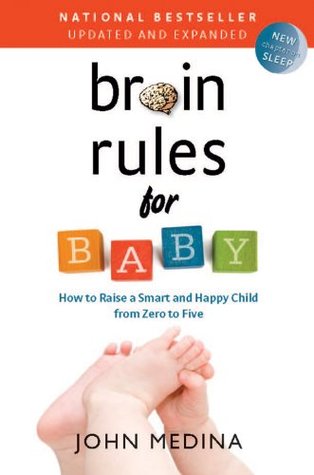More on this book
Community
Kindle Notes & Highlights
by
John Medina
Started reading
May 22, 2025
Having a first child is like swallowing an intoxicating drink made of equal parts joy and terror,
parenting is about brain development.
Myth: Playing Mozart to your womb will improve your baby’s future math scores.
Truth:
the greatest thing you can do is to teach her impulse control in her early years
Myth: Exposing your infant or toddler to language DVDs will boost his vocabulary.
Truth:
It is true that the number and variety of words you use when talking to your baby boost both his vocabulary and his IQ (see “Talk to your baby—a lot,” page 125). But the words have to come from you—a real, live human being.
Myth: To boost their brain power, children need French lessons by age 3 and a room piled with “brain-friendly” toys and a library of educational DVDs.
Truth: The greatest pediatric brain-boosting technology in the world is probably a plain cardboard box, a fres...
This highlight has been truncated due to consecutive passage length restrictions.
Myth: Continually telling your children they are smart will boost their confidence.
Truth: They’ll become less willing to work on challenging problems
praise his or her effort instead.
Myth: Children somehow find their own happiness.
Truth: The greatest predictor of happiness is having friends. How do you make and keep friends? By being good at deciphering nonverbal communication. (See “Helping your child make friends,” page 165.) Learning a musical instrument (see page 207) boosts the ...
This highlight has been truncated due to consecutive passage length restrictions.
Research like this is continually...
This highlight has been truncated due to consecutive passage length restrictions.
the Journal of Experimental Child...
This highlight has been truncated due to consecutive passage length restrictions.
Parenting research is tough to do, for four reasons:
1. Every kid is different
2. Every parent is different
Kids are influenced by others
One researcher has gone on record saying that peers—especially of the same sex—shape a child’s behavior much more than parents do.
Human behavior is complicated!
123 low-income, at-risk preschoolers
the HighScope Perry Preschool Study,
The first attended the preschool program (which eventually became a model for other preschool programs nationwide, including Head Start). The second group did not. The differences between the two groups powerfully illustrate the importance of a child’s early years.
kids in the program scored far better than the controls: a whopping 49 percent vs. 15 percent. Among girls, though not boys, more graduated from high school (84 percent vs. 32 percent).
As adults, those who had been in the program were less likely to commit crimes and more likely to hold steady jobs.
Economists calculated that the return on society’s investment in such a program was 7 to 10 percent, higher than what you’d h...
This highlight has been truncated due to consecutive passage length restrictions.
This career comes with no sick days or vacation time, and it puts you permanently on call nights and weekends. Its successful execution will probably turn you into a lifelong worrywart.
If as a parent you feel as though you can’t do it alone, that’s because you were never meant to.
The Brain Rules website, www.brainrules.net, is chock-full of additional supporting material, including dozens of videos.
Morning sickness,
This avoidance strategy would have kept our maternal ancestors away from the natural toxins in exotic or spoiled foods in the wild,
The accompanying fatigue would keep women from engaging in physical activity risky enough to harm the baby.
No commercial product has ever been shown to do anything to improve the brain performance of a developing fetus.
There are activities that expecting parents can do to aid the cognitive development of their baby-under-construction.
This is why every pregnancy book strongly recommends taking the B-complex
complex vitamin folic acid: It helps shape the proper neural tube—both the near and far ends. Women who take folic acid around conception and during the first few weeks of pregnancy are 76 percent less likely to create a fetus with neural tube defects than those who don’t take the supplement.
the baby would like to be left alone, in the first half of pregnancy.
parts of a baby’s brain can respond to sensory stimulation before a baby can actually perceive being stimulated.
Babies remember
“All the scores I knew by sight were the ones she had played while she was pregnant with me,”
what you eat and smell can influence your infant’s perceptions, too. For a newborn, these things are the familiar comforts of home.
Touch One of the earliest senses to come on line is touch. Embryos about 1 month old can sense touch to their noses and lips.
Sight
third trimester will move or alter their heart rate, or both, in response to a strong light beamed at the womb.
Hearing
During the final six weeks of pregnancy, women in a study were asked to read the Dr. Seuss book out loud twice a day.
The babies who had heard Dr. Seuss while in the womb appeared to recognize, and prefer, a tape of their mother reading The Cat in the Hat.


